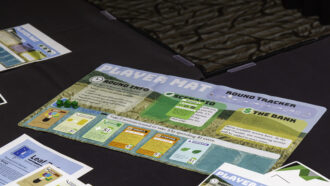At their annual meeting this summer, Western SARE state coordinators came together and played an educational board game about managing pests. Their experience was similar to other groups who indicate that they learn more by doing than listening.
Jason Thomas and Grant Loomis, extension educators at the University of Idaho, received a Western SARE grant which will help them further develop Pest Friends to enhance integrated pest management skills. Pest Friends is an educational strategy game about pest management for two or more players.
“With our grant, we will publish hundreds of copies of this game and then take it out and teach people how to use it,” says Thomas.
As Thomas and Loomis point out, most education designed to help farmers adopt IPM practices is conducted through traditional trainings. The goal of designing a board game is to help people learn more about how insects and other organisms interact with humans and their crops, and how decisions like spraying pesticides effect their field and the ecology within it.
In playing the game, one person is the moderator who facilitates by carrying out hidden consequences based on players’ decisions. The other players are pest managers who must make tough decisions about how to manage insects using a limited number of actions and money. At the end of the game, pest managers score points by how healthy their final crop is and how much money they spent.
Caitlin Price Youngquist, state coordinator and extension educator from Wyoming said after playing the game, “I really enjoyed the game and thought it was well designed. Pest management, like most things in agriculture, does not always have simple solutions and the game designers did a good job of illustrating that. I would love to have more games like this to use as teaching tools!”
According to Thomas and Loomis, current survey data from those who have played the game shows that 100% indicated that they found it more engaging to play the game than sit and listen to a PowerPoint presentation. It’s an alternative way to learn, with 80% saying that they learned more this way.
“The IPM game is an innovative tool to help growers visualize how their management practices can affect downstream issues and how not any one practice is effective at addressing the pest issue. I would definitely use this tool in my educational programs, especially if an electronic version is developed,” said Jensen Uyeda, state coordinator and extension agent from Hawaii.
Learn more about the game by watching The IPM Hour, and reading their project reports.
